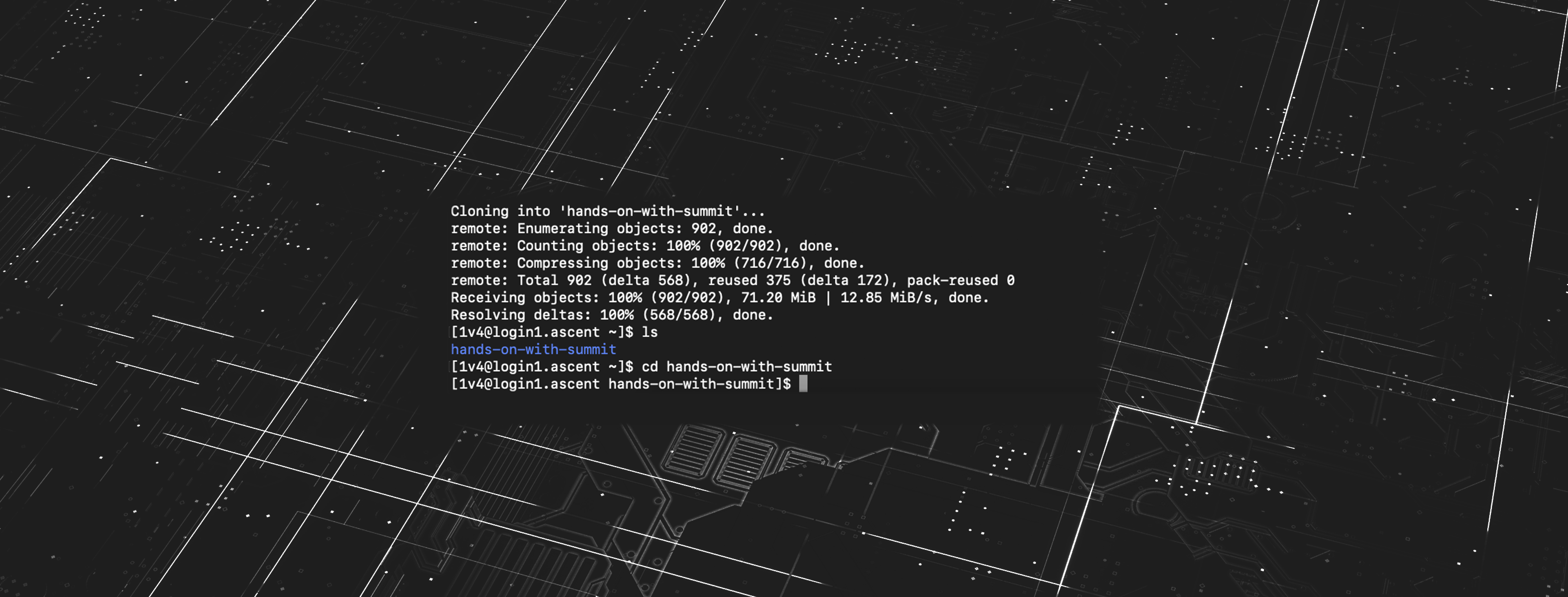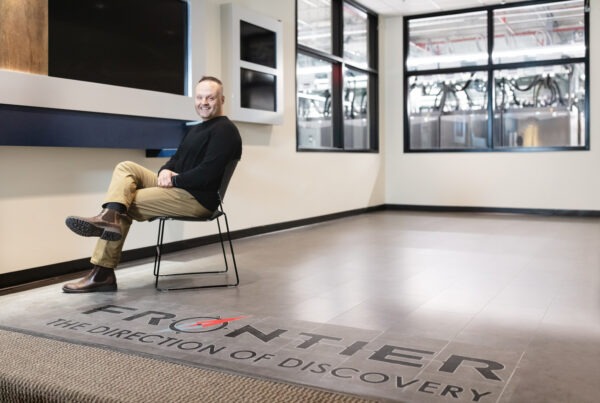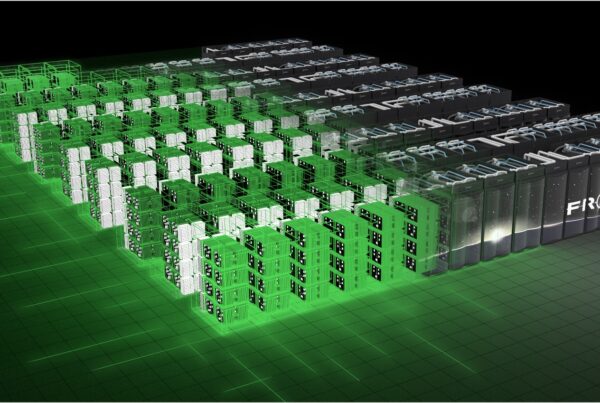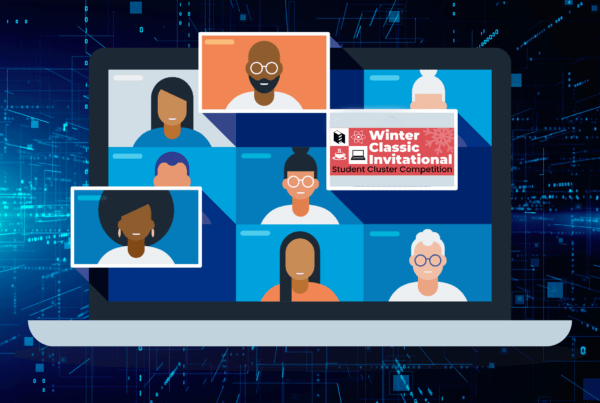A series of hands-on training seminars offered through the Oak Ridge Leadership Computing Facility (OLCF), a US Department of Energy Office of Science user facility located at Oak Ridge National Laboratory (ORNL), is opening the doors of high-performance computing (HPC) to a wider audience. Usually offered to participants at events such as the annual International Conference for High Performance Computing, Networking, Storage, and Analysis (SC), the organizers behind the Hands-on with Summit training have been working to expand the scope of the course to reach audiences that are often underrepresented in the HPC community.
The Hands-on with Summit training was first offered to students in the Students@SC program at SC19. At the request of ORNL Operations Section Head Ashley Barker, HPC engineers Thomas Papatheodore and Jack Morrison (now at Rescale) designed a course for students who had little to no background in HPC.
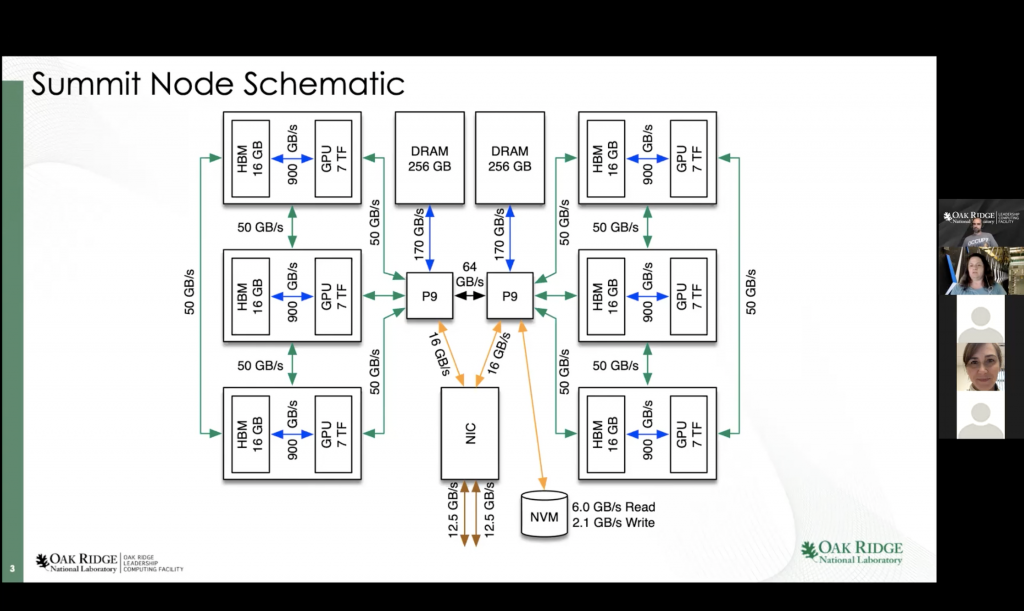
A screenshot from the introductory lecture from a 2021 Hands On with Summit training showing a schematic of the ICBM AC922 Summit node structure.
During the training, students are introduced to the overall user facility, to the IBM AC922 Summit supercomputer, and to the OLCF’s Ascent training system. Ascent is essentially a single cabinet’s worth of Summit nodes and is allocated for training new users—including students—on Summit’s node architecture, albeit at a smaller scale. In recent years, the organizers have added an overview of the science that HPC enables: advanced earthquake simulations, studying an x-ray burst moving across a neutron star, and modeling an aerosolized SARS-CoV-2 virus for the first time, to name a few. Students are then free to work through a set of self-paced challenges that present increasingly complex tasks designed to teach them the basics of using a supercomputer. OLCF staff are available to answer questions and help anyone who gets stuck.
Expanding the audience
The established structure and teaching experience from the SC workshops meant the organizers were well prepared when the Hispanic and Latino Organization for Leadership and Awareness (HOLA) approached them in September 2021 about hosting one of these courses for National Hispanic Heritage month, which would be open to a more general audience.
HOLA is one of ten Employee Resource Groups at ORNL, which are a key part of the lab’s diversity, equity, and inclusion efforts to “enlist and empower our employees to help create a community where everyone feels respected and valued.” Verónica Melesse Vergara, who is also the System Acceptance and User Environment group leader at ORNL, serves as a board member and is passionate about finding opportunities to share HPC and the lab’s work with HOLA and the wider community.
“I think because we have the resources, we have the expertise, I feel like it’s our responsibility to tell folks about it because HPC is sort of a big unknown for people in the community,” she said. “Outreach is key, and diversity and inclusion are important to me, so I try to find events that not only tell people about the lab and what we do in the OLCF but target communities that maybe wouldn’t be exposed to any of these things.”
In addition to a virtual tour of Summit led in Spanish, HOLA offered a virtual Hands-on with Summit training session that was open to everyone in the community, regardless of computing experience or background. The 55 attendees included ORNL staff, university students from the United States and Mexico, and a high school student.
The virtual format imposed by the ongoing COVID-19 pandemic has also reduced the barrier to entry for many students. “When we first had to go from in-person to virtual, I was a little worried about how negatively that would impact the attendance, but, overall, I think we’ve been able to reach more people. The HOLA event had users from all over the Americas. We could never have done that before virtual,” said Suzanne Parete-Koon, an HPC engineer who joined the training organizers in 2020.
Teaching students with minimal computing experience comes with its own challenges, but Papatheodore and Parete-Koon noted the exceptional quality of the questions that students asked during the SC21 and HOLA Hands on Summit training sessions.
“One of the things that I really liked about SC21 was the questions that students asked during the lectures, especially when Bronson [Messer, OLCF director of science] was giving the scientific, ‘So what?’ part of why we do this. I felt like we were doing the work we were supposed to be doing with this course when we were getting a really diverse set of questions from students who hadn’t had much exposure to HPC before,” said Parete-Koon.
Papatheodore noticed a similar trend at the HOLA event, saying, “There were a lot more questions, and I felt like they were good questions, where people were paying attention and wanting me to expand on certain things that I talked about.”
Looking forward
The organizers are now working to expand the training into a multi-day HPC Crash Course that includes a “day zero” module to teach the foundational skills for a true HPC beginner, including remote login and programming basics. This expanded course will be offered to universities and university programs that might not have a computing track or a computing focus, with the goal of exposing HPC to students who might not otherwise have the chance to explore scientific computing.
“We’re trying to increase the diversity within the HPC community through this program. We really want to reach out to the underrepresented people in HPC and give them an opportunity to be introduced to HPC and show them all of the opportunities they have to be part of this community,” said Barker.
A pilot course was offered in January 2022 at the University of Tennessee, Knoxville. Institutions interested in partnering with the National Center for Computational Sciences and the OLCF to bring the HPC Crash Course to their students should contact Ashley Barker at [email protected].
UT-Battelle LLC manages Oak Ridge National Laboratory for DOE’s Office of Science, the single largest supporter of basic research in the physical sciences in the United States. DOE’s Office of Science is working to address some of the most pressing challenges of our time. For more information, visit https://energy.gov/science.


